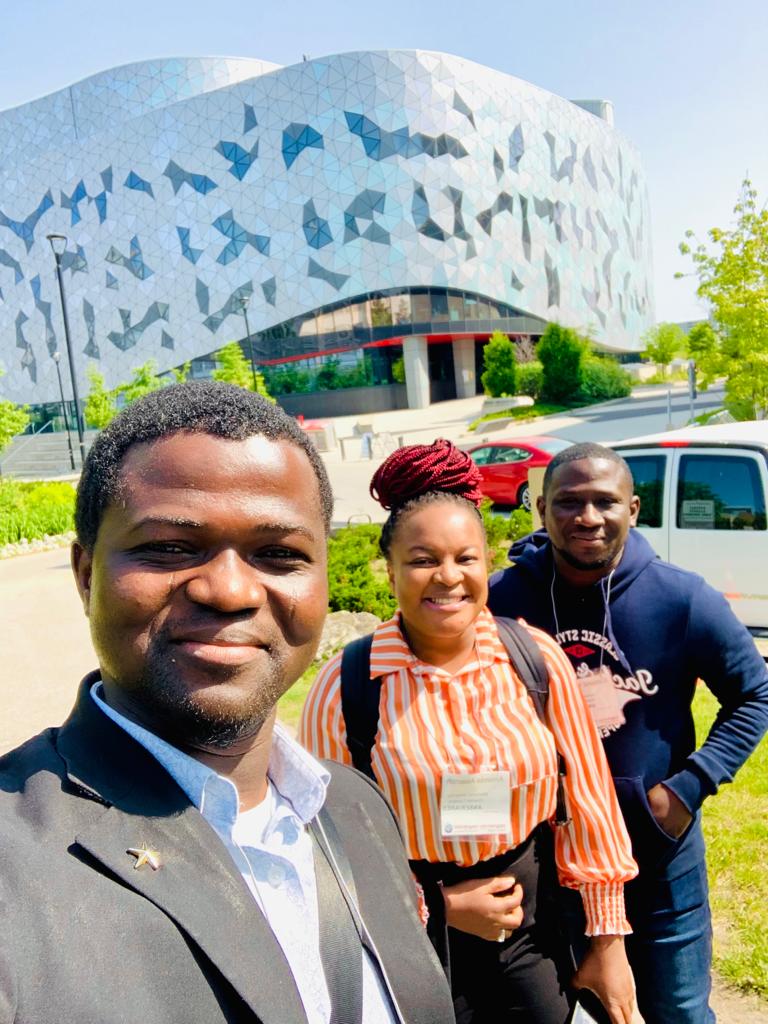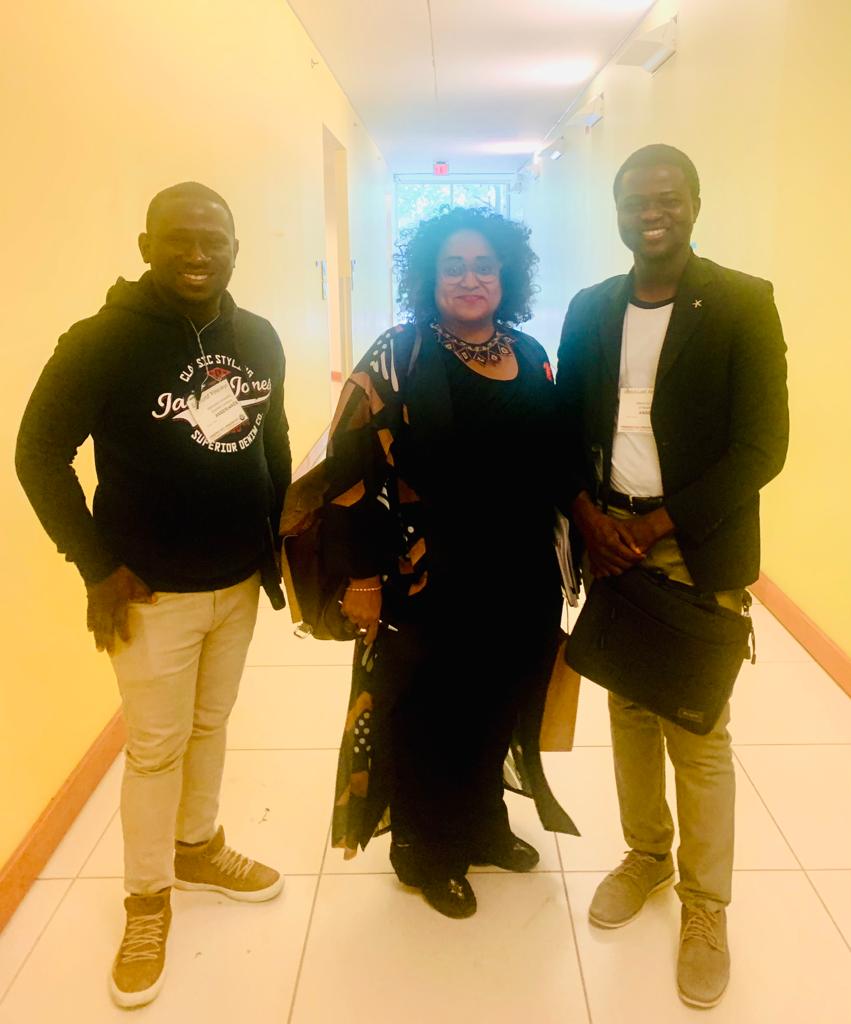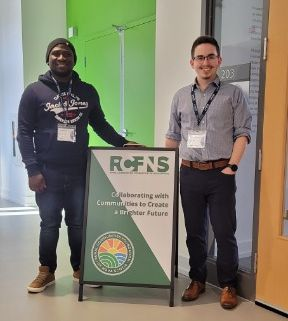Report on the Federation for the Humanities and Social Science Congress 2023
Amanda Asiamah, Abdul-Latif Alhassan, and Edmund Yirenkyi recently participated and presented at the Association for Nonprofit and Social Economy Research’s (ANSER) 16th annual conference which was part of the Congress of the Humanities and Social Sciences Conference.
Amanda is an incoming student to the TRSU PhD program, Abdul-Latif has been working as a research assistant with the PhiLab Atlantic Hub and Edmund is a current PhD student funded by PhiLab. The event, held at York University Keele and Glendon Campuses in Toronto, from May 27 to June 2, 2023, brought together a diverse gathering of renowned scholars and researchers from numerous academic disciplines, all converging to engage in the intellectual discourse surrounding the thought-provoking theme of “Reckonings and Re-imaginings.”
Conference Proceedings – Day 1: May 28, 2023:
The first day of the ANSER conference (May 28, 2023) commenced with an enlightening keynote address session on the theme “Reckonings and Re-imaginings: Fundraising, Donors, and Philanthropy” featuring distinguished professionals operating at the intersection of practice and academia in the philanthropic realm.
The panelists included Krishan Mehta, who brought on board his wealth of experience in transformational philanthropy, partnerships, and senior volunteer engagement, spanning over two decades, Paul Nazareth who also had an impressive career spanning over 20 years in Canada’s philanthropic sector, Paul Nazareth has held pivotal positions in renowned organizations such as the Canadian Association of Gift Planners (CAGP) and Canada. His expertise encompasses philanthropic advisory, wealth management, and extensive collaboration with diverse charitable organizations. The panelists also included Brianna Parent Long who holds the position of Feminist Programme Coordinator at VIDEA, where she actively advocates for gender equality.
Key Insights from the Panel Discussion:
Reimagining Fundraising:
The panel emphasized the necessity of reimagining fundraising practices to align with evolving societal values and address contemporary challenges. They highlighted transformative partnerships, effective stewardship, and the utilization of diverse philanthropic resources as key factors in fostering successful fundraising endeavors.
Donor Engagement:
Understanding donor motivations and establishing meaningful relationships were highlighted as fundamental aspects of donor engagement. The panelists stressed the importance of transparency, accountability, and the integration of technology and personalized approaches to enhance donor interactions.
Philanthropic Studies:
The discussion underscored the significance of philanthropic studies in shaping effective strategies. Encouragement was given for interdisciplinary research, exploring the contributions of immigrant and diaspora communities, and integrating decolonial and feminist perspectives into the study of philanthropy. The panelists also highlighted diaspora philanthropy which they defined as the charitable giving of immigrants and their descendants to causes in their home countries or in the countries where they now reside.
They mentioned that diaspora philanthropy is becoming increasingly important in Canada for several reasons. First, the number of immigrants in Canada is growing, and many of these immigrants are affluent and have a strong desire to give back to their communities. Second, the internet and other technologies have made it easier for diaspora philanthropists to connect with causes in their home countries. Third, the Canadian government has made some policy changes in recent years to encourage diaspora philanthropy. According to them, “What do you need and how can I help make it happen” is a much more important question for donors/funders than “Why do you need my money”.
After the keynote panel discussion, Amanda and Abdul attended a hybrid roundtable discussion on “CORNPHIL – How about Northern and Rural Philanthropy?” This roundtable CORNPHIL discussion was organized by PhiLab Ontario to discuss philanthropy in Northern and Rural areas. CORNPhil is a new research consortium which consists of researchers from Canada and the US, aims to address challenges and complexities around rural and northern philanthropy. Regrettably, it is worth noting that the roundtable’s attendance fell below expectations, which may have inadvertently hindered the breadth and depth of the scholarly discourse. However, despite the limited turnout, the engaged participants contributed substantively to the scholarly discussions, thereby augmenting the collective understanding and knowledge base surrounding philanthropic practices in Northern and Rural areas.
Edmund attended a paper panel presentation on the theme of “Emerging trends in philanthropy”. The paper panel presentation was excellent. Edmund presented his paper on “The role of philanthropy in financing climate change mitigation and adaptation in Canada.” Two other presenters also presented their papers at this session. Shaninomi Eribo from Carton University presented on “How the community foundation corporate structure enables Canadian credit unions to overcome barriers to social innovation, achieve capacity utilization, and enhance social impact, and Tiana Marrese from the University of Pennsylvania also presented her Ph.D. dissertation on “(In)formal behaviors: The unobserved demographics of Americans practicing prosocial behaviors”
The sessions highlighted the important role foundations and non-governmental organizations are playing to address climate change challenges in Canada, fostering public awareness, and mobilizing support for climate action. However, Edmund’s presentation stresses that philanthropic funding for climate change remains limited, prompting a call for increased support to effectively address this urgent global issue. Shaninomi Eribo’s presentation also shed light on the fact that the corporate structure community foundation enables Canadian credit unions to overcome barriers to social innovation, maximize capacity utilization, and enhance social impact. Tiana’s also highlighted that the unobserved demographics of Americans engaging in prosocial behaviors, such as age, race, gender, education, and income challenge prevailing assumptions on giving and contribute to a more nuanced understanding of the diverse individuals driving prosocial behaviors in American society. A 45-minute discussion with an editor from CJNSER followed the presentations, during which Edmund connected with Melissa Wilson, a student researcher from the Ontario Hub of PhiLab.
After the paper panel presentation, Abdul-Latif, Amanda, and Edmund had the chance to attend the Lunch & Meet with Editors of the Canadian Journal of Nonprofit and Social Economy Research (CJNSER). The lunch was informal and informative. We met with Laurie Mook, the Chief Editor of CJNSER, and learned more about the journal and its publishing process. We learned that publishing in CJNSER is free since the journal is funded by SSHRC. CJNSER has a faster review time than most journals and the reason why a paper may not be accepted for publication is because it does not fit into the journal’s mission of publishing only papers on non-profits and artificial intelligence. We engaged in an informal and informative session with Laurie Mook, the Chief Editor, where we learned about publishing opportunities and the review process. Although Fiona Pollock was absent, the attendees briefly interacted with Laurie Mook at the President’s reception later in the day.
Conference Proceedings – Day 2: May 29, 2023: The highlight of the day was the captivating keynote address by Dr. Caroline Shehaz Hossein, titled “Re-imagining cooperative futures: Africana Women Cooperation on solidarity economies for Canada and the World.” The address shed light on the potential of Africana women in shaping solidarity economies and sparked meaningful discussions among the attendees. According to her:
- Black economic collectives have a long history in Canada, dating back to the early 19th century.
- Black women have been the driving force behind many of these collectives, using them to build community, resist racialized economic exclusion, and create sustainable livelihoods.
- Black economic collectives face several challenges, including lack of access to capital, discrimination, and the gendered nature of care work.
- Despite these challenges, Black economic collectives have been successful in providing economic opportunities for Black people and building strong communities.
The project Dr. Shehaz Hossein noted that Black economic collectives are based on many African principles, such as cooperation, mutual aid, and shared responsibility. These principles have helped to sustain Black economic collectives over time and make them a valuable resource for Black communities. Though this keynote address had no direct link to my Ph.D. research on financing climate change mitigation and adaptation, there are ways I find the information useful to apply to my future research. For instance, since climate philanthropy involves donating money to organizations working to address climate change, black economic collectives can connect with climate philanthropy by supporting organizations that build climate resilience in Black communities. These organizations can help reduce food insecurity, improve air quality, and reduce carbon emissions. Additionally, philanthropists can support organizations promoting environmental justice, climate justice, and economic justice in black communities to fight environmental racism. By investing in these collectives, more resilient and sustainable communities can be built while addressing the root causes of climate change.
Highlights: The Federation for the Humanities and Social Science Congress 2023 provided a platform for scholars and researchers to gather and explore the theme of “reckonings and re-imaginings.” Despite the challenges faced in attendance and scheduling conflicts, the conference offered valuable opportunities for networking, knowledge sharing, and engaging discussions. The attendees, Amanda, Abdul, and Edmund, made the most of our experience, presenting our research, connecting with editors, and attending informative sessions. The keynote address by Dr. Caroline Shehaz Hossein served as a thought-provoking conclusion to the event, encouraging attendees to contemplate the re-imagining of cooperative futures in the context of Africana women’s contributions to solidarity economies. Overall, the congress provided a fruitful experience for all participants. She is a leading scholar on the topic of Africana women’s cooperation. In her keynote address, Dr. Hossein discussed the importance of cooperative economics for Africana women and communities. She argued that cooperative economics can be a powerful tool for social and economic transformation. This session was heavily attended and was very engaging.
The FHSS Congress 2023 was a stimulating and intellectually enriching experience. We learned a lot from the conference, and we made some valuable connections with other scholars in our field. We look forward to participating in future congresses and continuing to build our networks in the humanities and social sciences.




